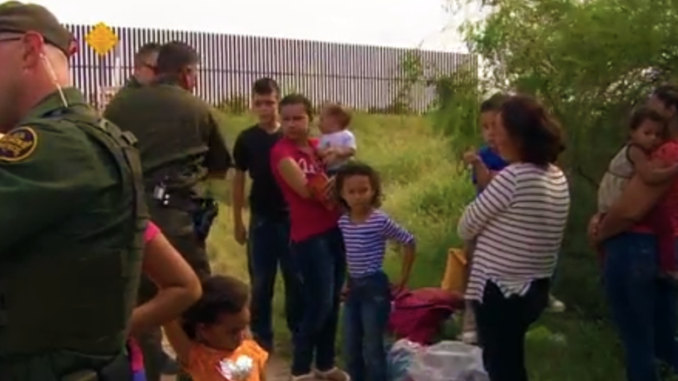
Family arrests at the US southern border showed little change for the month of July, despite the Trump administration’s weeks-long “zero tolerance” policy, Politico reported Friday.
The controversial directive, ordered by Attorney General Jeff Sessions on April 6, ordered every immigrant found to have entered the country illegally to be referred for prosecution. It was intended by the administration as a deterrent against illegal immigration, Reuters explained in March: “With safety in mind, the Department of Homeland Security continually explores options that may discourage those from even beginning the journey,” the DHS said in a statement to Reuters.
Also, then-Homeland Security Secretary John Kelly confirmed to CNN’s Wolf Blitzer in March 2017 that he had considered such a plan, explaining that “We have tremendous experience of dealing with unaccompanied minors…Yes I’m considering (that), in order to deter more movement along this terribly dangerous network. I am considering exactly that.”
Nevertheless, according to Politico’s report, approximately 9,300 family members were arrested at the border in July. The numbers were “virtually unchanged” from recent months: 9,449 families were arrested in June, 9,485 in May, and 9,652 in April. Further, Politico notes, Border Patrol arrested roughly 31,000 immigrants at the southwest border in July, an amount which “tracks closely with the average for July over the past decade,” though still being up from Trump’s first year in office.
Trump’s administration received strong backlash against the policy, which had been condemned by over 200 child welfare organizations before it was even authorized. After Sessions announced the policy in May, dozens of protests were held, numerous religious groups expressed disapproval, and the Office of the United Nations High Commissioner for Human Rights urged the White House to “immediately halt” the separation of families. Polls showed that the policy was strongly opposed by both Democrats and independents, though it was supported by a narrow majority of Republicans.
Following this criticism, Trump issued an executive order on June 20, directing the DHS to take extra measures to ensure families were kept together, while still keeping the zero tolerance prosecutorial referral policy in place. Eventually, as the logistics of prosecuting every person illegally crossing the border became obvious, the policy was essentially ended.
The aftermath of the policy is still unfolding. On July 26, a federal judge, in response to a lawsuit brought by the American Civil Liberties Union, ordered the Trump administration to return all separated children to their respective families within 30 days. The administration says that 1,442 of the children have been reunited with their parents, while 711 remain in government shelters.
As officials work to meet the deadline, the effectiveness of the policy as a deterrent remains unclear. “It takes a while for us to really know the impact of changes and policies at the border,” Theresa Cardinal Brown, director of immigration and cross-border policy at the Bipartisan Policy Center, told Politico. Families fleeing poverty or oppression might not be willing to change their plans regardless of policy, she said, adding that they also might be unaware of the current developments in U.S. law enforcement: “A lot of them are informed, frankly, by what the smugglers tell them.”
Why It Matters
Recent reports have emerged of terrible abuses that occurred at immigrant shelters, before and during Trump’s presidency and his policy of zero tolerance. Not only are these stories tragic in and of themselves, but they constitute an enormous political liability for the Trump administration, which has already been heavily battered over its shortsighted approach to illegal immigration. The payoff for that being at best a minimal reduction in arrests is simply not a good return on the investment of substantial political capital.
Securing the border is important. But poorly thought-out policies that put people’s lives at risk and that don’t solve the underlying problems will make that goal less and less obtainable.

1 Trackback / Pingback
Comments are closed.